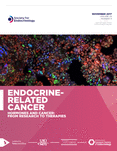Be a good listener and be persistent
- Medicine and Surgery, Cedars-Sinai Medical Center, Los Angeles, CA, USA
- Correspondence should be addressed to L W K Chung; Email: Leland.chung{at}cshs.org
I grew up in a modest family, but I received a tremendous amount of encouragement from my parents to pursue higher education. I consider myself extremely fortunate to be a scientist. I started my life as a refugee running from one province to the other to avoid air and land assaults from the Japanese army. Then we moved to Taiwan where I enjoyed a peaceful life and an uninterrupted education. My parents wanted their children to be professionals after the political darkness they saw during the war. I had a great opportunity to be recruited to the USA to continue my graduate education. I marched into medical sciences at the University of Oregon Medical School after completing my masters degree in a biochemistry program at Oregon State University. I graduated from the Department of Pharmacology under my mentor Dr John Gabourel, who insisted on having his students repeat their experiments multiple times and conduct sound statistical analyses.
I got a real taste of the ‘translational research’ that challenges basic laboratory researchers when I joined Dr Donald S Coffey's laboratory at Johns Hopkins. Don's laboratory trained clinicians, residents, scientists, and medical and graduate students all together, but the trainees had vastly different backgrounds and skills. We interacted well and learned from each other. I was fascinated by the depth of knowledge basic scientists could contribute to clinical insight into diseases, including the molecular basis of androgen independence in prostate cancer and the use of experimental animal models such as normal rat prostate, Dunning, or Shionogi models to study this process. Remarkably, the problems of androgen independence and therapeutic resistance remain the highest unsolved priorities in prostate cancer research since the discovery by Charles Huggins in 1940 that surgical castration was an effective way to manage prostate cancer. Don has an unusual …












